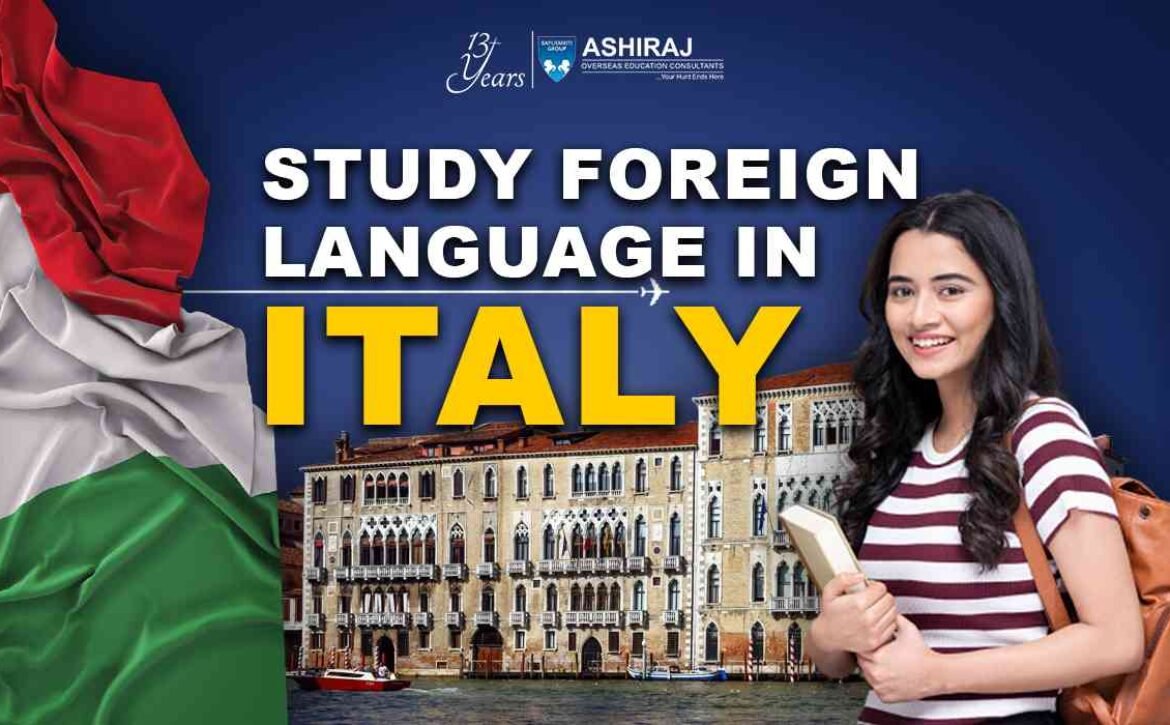
Foreign Language in Italy
Foreign language learning in Italy is a dynamic and integral component of the country’s educational system and cultural ethos. With a rich history and diverse linguistic landscape, Italy recognizes the importance of multilingualism in fostering global connections and enhancing professional opportunities. Foreign language acquisition, including English, French, German, and Spanish among others, is emphasized from early education through university levels. The Italian educational framework places significant emphasis on practical language skills, ensuring proficiency in both spoken and written communication.
In Italy, foreign language proficiency is not only viewed as a valuable asset for personal development but also as a critical skill in various sectors, including information technology (IT). As Italy continues to play a prominent role in the global IT industry, proficiency in foreign languages opens doors to international collaborations, business ventures, and technological advancements. The integration of foreign language education within the IT landscape underscores Italy’s commitment to innovation and cross-cultural exchange, fostering a vibrant environment where language fluency complements technical expertise. Foreign Language in ITALY is not merely a subject of study but a gateway to professional success and intercultural dialogue in the digital age.
Why Study Foreign Language in Italy?
- Cultural Immersion: Studying a foreign language in Italy offers unparalleled cultural immersion. Being surrounded by native speakers provides an authentic language-learning experience.
- Rich Linguistic Heritage: Italy boasts a rich linguistic heritage with various regional dialects and languages. Learning a foreign language in Italy exposes students to linguistic diversity and historical significance.
- Global Career Opportunities: Proficiency in a foreign language, especially in Italy, opens doors to global career opportunities. Italy’s strategic location in Europe makes it a hub for international business, diplomacy, and tourism.
- Enhanced Communication Skills: Learning a foreign language enhances communication skills, fostering effective cross-cultural interactions and understanding.
- Academic Excellence: Italy is renowned for its academic excellence in language studies. Institutions offer comprehensive language programs led by experienced educators.
- Cultural Exchange: Studying a foreign language in Italy facilitates cultural exchange, allowing students to gain insights into Italian customs, traditions, and way of life.
- Integration into Global IT Industry: Italy’s growing prominence in the global IT industry makes foreign language proficiency, including English, essential for professionals seeking career advancement and collaboration opportunities.
- Personal Enrichment: Learning a foreign language in Italy is a personally enriching experience, promoting intellectual growth, and fostering a deeper appreciation for language and culture.
Foreign Language in Italy provides a multifaceted learning experience that extends beyond language proficiency, enriching students’ lives personally and professionally.
Top Universities to Study Foreign Language in Italy
University | QS World University Ranking 2023 | Type of University | Average Annual Fees | Programs Offered |
University of Bologna | 101-150 | Public | €2,000 – €3,000 | Italian Language and Culture, |
English Language and Literature | ||||
Politecnico di Milano | 151-200 | Public | €1,500 – €2,500 | English for Science and Technology, |
Italian Language and Culture | ||||
University of Milan | 201-250 | Public | €1,500 – €2,500 | Italian Language and Literature, |
Foreign Language Teaching | ||||
Sapienza University of | 251-300 | Public | €2,000 – €3,000 | Italian Language and Culture, |
Rome | Linguistics and Translation Studies | |||
University of Florence | 301-350 | Public | €1,500 – €2,500 | Italian Language and Literature, |
Foreign Language Teaching |
Foreign Language in Italy holds great importance, and the country’s universities offer excellent programs to facilitate language learning. Here are the top 5 universities in Italy for studying foreign languages, along with their QS World University Rankings for 2023, type of university, average annual fees, and programs offered. These universities provide diverse language programs, including Italian language and culture, English literature, linguistics, and translation studies, catering to the diverse needs of language learners. Whether students seek to immerse themselves in the Italian language or explore other foreign languages, these universities offer comprehensive programs designed to enhance language proficiency and cultural understanding.
Course Curriculum for Foreign Language in Italy
- Language Proficiency: The curriculum focuses on developing proficiency in the target language, emphasizing speaking, listening, reading, and writing skills.
- Cultural Studies: Students delve into the cultural aspects of the language, studying literature, history, art, and societal norms to gain a holistic understanding.
- Grammar and Syntax: Courses cover grammar rules, syntax, and sentence structure to enhance linguistic accuracy and fluency.
- Communication Skills: Practical language Italyge is emphasized, enabling students to effectively communicate in various real-life situations.
- Translation and Interpretation: Programs offer training in translation and interpretation, equipping students with the skills to bridge language barriers in professional settings.
- Language Technology: Some courses integrate language technology tools and software to aid in language learning and linguistic analysis.
- Specialized Tracks: Students may choose specialized tracks based on their interests, such as business language, medical language, or legal language.
- Cultural Immersion: Immersion experiences, such as study abroad programs or cultural exchanges, supplement classroom learning and provide authentic language practice.
- Assessment and Certification: The curriculum often includes assessments and certification exams to evaluate language proficiency levels and provide recognized credentials.
Foreign Language in Italy encompasses a comprehensive curriculum designed to foster linguistic proficiency, cultural appreciation, and practical communication skills. With a focus on both language mastery and cultural understanding, these programs prepare students for diverse personal, academic, and professional opportunities in an increasingly interconnected world.
Eligibility Criteria & Admission Requirements for MS in Foreign Language in Italy
- Language Proficiency Tests: Applicants are typically required to demonstrate proficiency in the language of instruction through standardized tests such as IELTS or TOEFL. Minimum score requirements vary by institution.
- Standardized Tests (Optional): Some universities may also require standardized test scores such as GRE or GMAT for admission to certain language programs, especially at the graduate level.
- Passport & Student Visa: International students must possess a valid passport and obtain a student visa to study in Italy. Visa requirements vary by nationality, and students should consult the Italian consulate or embassy in their home country for specific guidelines.
- Academic Certificates: Applicants must submit academic certificates, including transcripts and diplomas, to demonstrate their educational qualifications and eligibility for the program.
- Work Experience (if applicable): Some language programs may require or prefer applicants with relevant work experience in fields such as translation, interpretation, or language teaching.
Table: Scores for Language Proficiency and Standardized Tests
Test | Minimum Score |
IELTS | 6.0 – 7.5 |
TOEFL | 80 – 100 |
GRE | 150 – 160 |
GMAT | 550 – 650 |
Foreign Language in Italy programs maintain stringent eligibility criteria to ensure that students possess the necessary language proficiency and academic background to succeed in their studies. Additionally, meeting visa requirements and providing relevant documentation are essential steps for international students planning to pursue language studies in Italy.
Documents Required for Studying Foreign Language in Italy
- Passport: A valid passport is essential for international students applying to language programs in Italy.
- Two Letters of Recommendation (LOR): Applicants typically need to submit LORs from academic or professional referees attesting to their qualifications and character.
- Statement of Purpose (SOP): An SOP outlining the applicant’s academic background, language learning goals, and reasons for choosing the specific program is usually required.
- Curriculum Vitae (CV): A comprehensive CV highlighting educational background, language proficiency, work experience, and relevant skills is necessary for the application process.
- Official High School Transcripts: Applicants must provide official transcripts from their high school or secondary education institution.
- Educational Certificates: Certificates of completion or diplomas from previous academic institutions should be submitted as part of the application package.
- Work Experience Certificate (if applicable): Applicants with relevant work experience may need to provide a certificate or letter from their employer verifying their employment history and skills.
- Proof of Financial Resources: Proof of financial resources, such as bank statements or scholarship award letters, is required to demonstrate the applicant’s ability to cover tuition fees and living expenses while studying in Italy.
Foreign Language in Italy programs require a comprehensive set of documents to evaluate applicants’ qualifications and ensure their readiness for language studies in an Italian academic setting. Providing accurate and complete documentation is crucial for a successful application process.
Admission Process for Foreign Language in Italy
- Research Programs: Explore language programs offered by universities in Italy and select those that align with your interests and career goals.
- Check Eligibility Criteria: Review the admission requirements, including language proficiency tests (IELTS, TOEFL), standardized tests (GRE, GMAT), and academic qualifications.
- Prepare Required Documents: Gather necessary documents such as passport, letters of recommendation (LOR), statement of purpose (SOP), curriculum vitae (CV), official transcripts, educational certificates, work experience certificates, and proof of financial resources.
- Submit Online Application: Complete the online application form provided by the university or the central admissions portal, ensuring all information is accurate and up-to-date.
- Pay Application Fee: Pay the application fee as required by the university, typically through secure online payment methods.
- Submit Language Test Scores: Arrange for official score reports to be sent directly to the university from the testing agencies for language proficiency and standardized tests.
- Attend Interviews (if required): Some programs may require interviews as part of the admission process. Prepare adequately and attend the interviews as scheduled.
- Wait for Admission Decision: After applying, wait for the university’s decision on your admission status. This may take several weeks depending on the program and the university’s admission timeline.
Foreign Language in Italy programs follow a structured admission process to ensure that prospective students meet the requirements and are well-prepared for language studies in an Italian academic environment. It is essential to carefully follow each step of the process and submit all required documents within the specified deadlines for a smooth application experience.
“Education is the most powerful weapon which you can use to change the world.”
Nelson Mandela
Cost of Foreign Language Course in Italy
- Tuition Fees: Tuition fees for language programs in Italy vary depending on the university, program level, and duration. On average, international students’ annual fees range from €1,500 to €3,000.
- Living Expenses: Consider the cost of living in Italy, including accommodation, meals, transportation, and personal expenses. Monthly living expenses can range from €800 to €1,200, depending on the city and lifestyle.
- Textbooks and Materials: Budget for textbooks, language learning materials, and other supplies required for your language studies. This cost varies depending on the program and curriculum.
- Health Insurance: International students are typically required to have health insurance. Costs vary, and it’s essential to explore different insurance options to find the most suitable coverage.
- Visa Fees: Budget for visa application fees, which vary based on nationality and type of visa. Ensure all necessary documents are prepared to facilitate a smooth visa application process.
- Language Proficiency Tests: If not already taken, budget for the costs associated with language proficiency tests such as IELTS or TOEFL, which are often required for admission.
- Extracurricular Activities: Consider additional costs for extracurricular activities, cultural events, and travel to explore Italy during your studies.
Foreign Language in Italy programs offer a diverse range of costs to consider, encompassing tuition fees, living expenses, and various other aspects. Prospective students must budget carefully and explore available scholarships or financial aid options to support their language-learning journey in Italy.
Scholarships for Foreign Language Courses in Italy
Scholarship Name | Amount | Application Deadline |
Italian Government Scholarships | Varies based on program and need | Varies (typically between January and April) |
Erasmus+ Scholarships | Varies based on program and destination | Varies (check specific deadlines for each program) |
University Scholarships | Varies based on institution and criteria | Varies (usually between March and May) |
Italian Language Scholarships | Varies based on program and institution | Varies (check specific deadlines for each scholarship) |
Cultural Exchange Scholarships | Varies based on sponsoring organization | Varies (check specific deadlines for each scholarship) |
Foreign Language in Italy programs offer various scholarships to support international students pursuing language studies. These scholarships cover tuition fees, living expenses, and other costs associated with studying in Italy. Applicants should carefully review scholarship eligibility criteria, application requirements, and deadlines to ensure timely submission of their applications. Additionally, students are encouraged to explore external funding opportunities and financial aid options to supplement their scholarship applications. With careful planning and research, students can access financial support to pursue their language learning goals in Italy.
Career Opportunities After Foreign Language in Italy
Job Profile | Average Salary (EUR) |
Translator/Interpreter | 25,000 – 40,000 |
Language Teacher | 20,000 – 35,000 |
Language Specialist | 30,000 – 45,000 |
International Relations Specialist | 35,000 – 50,000 |
Tour Guide | 18,000 – 30,000 |
Foreign Language in Italy opens up diverse career opportunities across various sectors. Translators and interpreters play a vital role in facilitating communication between individuals and organizations, with salaries ranging from €25,000 to €40,000 annually. Language teachers are in demand in educational institutions and language schools, earning between €20,000 to €35,000 per year. Language specialists, including linguistic analysts and language consultants, can earn salaries ranging from €30,000 to €45,000 annually.
Professionals in international relations specialize in diplomatic affairs, cross-cultural communication, and international business, with salaries averaging between €35,000 to €50,000 per year. Tour guides offer cultural and historical insights to visitors, earning salaries ranging from €18,000 to €30,000 annually.
With language proficiency and cultural understanding, individuals can pursue rewarding careers in Italy’s vibrant job market, contributing to cross-cultural exchange and global communication.
Frequently Asked Questions About Foreign Language in Italy
Absolutely! Many language schools and universities in Italy offer courses tailored to beginners, providing a supportive environment for language learners at all levels.
Yes, there are scholarships offered by the Italian government, universities, and external organizations to support international students pursuing language studies in Italy.
Commonly accepted language proficiency tests include IELTS, TOEFL, and sometimes Cambridge English exams. Requirements may vary depending on the institution and program.
Yes, international students are allowed to work part-time while studying in Italy, usually up to 20 hours per week during the academic year and full-time during holidays.
Yes, many universities in Italy offer language programs taught in English, especially at the graduate level. These programs cater to international students who may not be proficient in Italian.
The duration depends on various factors such as the individual’s starting proficiency level, intensity of study, and immersion opportunities. However, many students achieve proficiency within a year or two of dedicated study.
Yes, international students planning to study in Italy for more than 90 days must apply for a student visa. Requirements and application procedures vary by nationality, so it’s essential to check with the Italian consulate or embassy in your home country.
Absolutely! Italy offers abundant opportunities for cultural immersion through language exchange programs, cultural events, and interaction with locals in everyday life.
Yes, language graduates can explore various career paths including translation, interpretation, language teaching, international relations, tourism, and more in Italy’s diverse job market.
Yes, students can explore options for extending their stay in Italy for further studies or work opportunities, subject to visa regulations and requirements. It’s advisable to consult with immigration authorities or relevant institutions for guidance.




